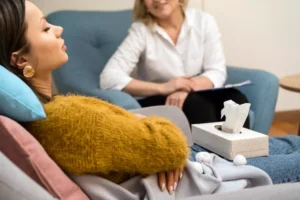Anxiety can make you desperate. Not just for triggers, but also for a treatment.. any treatment, unfortunately. ASMR (Autonomous Sensory Meridian Response) is one such solution that may work like a soothing balm. Why? Because it may distract you from teeming anxious thoughts.
However: Is it a potent solution or just a soothing distraction from the real problem? Does ASMR help with anxiety? This blog post tells you more about ASMR, its limitations in the face of anxiety, and alternative therapies that may be more effective.
The ASMR Sensation: Unpacking the Popularity
ASMR is the new rage now. Almost everyone feels giddy at the sounds of: soft whispers, the rustle of paper, or the gentle tapping of keys… or nails. It gives you a soothing sensory experience that can trigger calming, tingling sensations. This mechanism has increased its popularity rather quickly. Many people say that they feel relaxed after watching an ASMR video. However, does ASMR help with anxiety? Read on to find out.
The ASMR Effect: A Momentary Haven
Does ASMR help wit anxiety? Its effectiveness can be attributed to its capacity to engage the sensory perception and imagination of its listeners, providing immediate relief from the symptoms of anxiety. It activates your brain’s areas that control emotion, reward, and social engagement. So, it gives you a temporary reprieve from the relentless anxious thoughts.
Does ASMR Help with Anxiety?
Although ASMR diverts you from anxiety, it has its own set of limitations. One of the main ones is… that it is not permanent or even a bit long-term. The calm and relaxation you feel by watching or hearing ASMR videos ends very quickly… almost as soon as you turn them off.
It can send you back to your negative thoughts. Your symptoms may become worse because you may get frustrated quickly.
Moreover, ASMR is not as soothing to everyone. Some people might find the whispering voices and gentle sounds very relaxing. Others might feel uncomfortable. So, the results are not always consistent.
Finally, does ASMR help with anxiety? It may not help. ASMR does not give a concrete solution for the hidden causes of your anxiety. It may slow down the symptoms for literally a moment. However, it does nothing to change your negative thoughts into positive ones. Thus, your anxiety remains the same. It is much like smoothing over the surface of a turbulent ocean – the underlying currents remain undisturbed and ready to rise again.
Tackling Generalised Anxiety: A Deeper Dive
Chronic anxiety is like an overactive alarm system – it keeps you in a constant state of stress or fear, even when there’s no actual threat. This is essentially your ‘fight or flight’ response gone haywire, and it can have serious impacts on both your physical and mental health.
So, does ASMR help with anxiety? True healing from anxiety entails much more than mere symptom management. It calls for a comprehensive approach that addresses the root causes of anxiety. This includes lifestyle modifications, Hypnotherapy, Cognitive-behavioural therapy, Havening, all aimed at equipping individuals to release deeply entrenched anxiety and manage triggers effectively.
The Promise of Hypnotherapy: A Journey to the Roots
Unlike ASMR, hypnotherapy offers a path that leads to the heart of anxiety. It takes a holistic approach that goes beyond mere symptom management.
Hypnotherapy for anxiety helps to quieten that overactive alarm system. It doesn’t just help you relax in the moment – it also works to change those deep-seated thought patterns that are causing your alarm system to go off in the first place.
It does this by working with your subconscious mind, helping you to see and respond to things differently, which can reduce those feelings of anxiety over time.
It equips individuals with the tools to manage triggers, shift limiting beliefs, and even address intergenerational anxiety. Does ASMR help with anxiety more than hypnotherapy? It doesn’t. Hypnotherapy does it better.
Hypnotherapy engages brain regions associated with control and attention, fostering better emotional regulation by resetting the false alarm in the brain.
The Unseen Foe: What ASMR Misses
While ASMR offers a soothing experience, it fails to address these deeper facets of anxiety. It does not equip individuals with the tools to manage triggers, shift limiting beliefs, or address intergenerational anxiety.
These are the unseen foes that lurk beneath the surface, feeding the cycle of anxiety. ASMR merely masks these foes with a comforting blanket of sensory stimulation, providing temporary relief but not addressing the root problem.
In a Nutshell
ASMR can help you become calm whenever you feel anxious. It is somewhat like a comforting lullaby that eases your worries. However, does ASMR help with anxiety? It might be a temporary relief, but it is not the actual solution.
However, hypnotherapy helps you deal with the bigger picture. It delves into your deep-seated thoughts and beliefs, helping you change the way you think about and respond to anxiety. It helps you manage stress better than ASMR.
So, if you’re looking for a way to manage and eventually overcome your anxiety, consider a holistic approach like hypnotherapy. Book a Free Strategy Call with us now to learn more.
Frequently Asked Questions
What Does ASMR Mean?
ASMR stands for Autonomous Sensory Meridian Response. It is a term that describes a feeling of euphoric tingling and relaxation that some people experience as a response to specific stimuli, such as whispering, close personal attention, or certain sounds like the crinkling of paper. ASMR is used by some people for relaxation and sleep aid, and it’s especially popular in the form of ASMR videos on platforms like YouTube.
ASMR Hypnosis by ASMR artist vs Hypnotherapy by a Hypnotherapist?
ASMR artists focus on creating a calming, sometimes tingling sensation that can help promote relaxation and sleep. ASMR sleep hypnosis might involve soft-spoken or whispered words, soothing sounds, and visuals aimed at triggering ASMR and encouraging relaxation. However, ASMR artists typically do not have formal training in hypnotherapy or psychology.
Hypnotherapists, on the other hand, are professionals trained in hypnosis as a therapeutic technique. In sleep hypnotherapy, the hypnotherapist uses relaxation techniques to guide you into a deeply relaxed state – similar to the one experienced in ASMR – but then takes a step further.
What Is the Process Like When Working With a Clinical Hypnotherapist for Improved Sleep?
The process has following stages: Entering the Hypnotic State, Identifying the Root Cause, Applying the Hypnotic Techniques, and Hypnotic Suggestions for Sustained Sleep.










